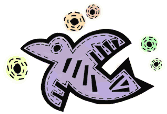|
Schedule |

Dynamic Aspects Workshop (DAW05)
Schedule
For the format, please see below.
The papers can be downloaded as single PDF files from the schedule below. Alternatively, the entire proceedings are available in one PDF file.
| 9:00-9:15 | Welcome and introduction to the workshop | |
| Session 1: Applications | ||
|---|---|---|
| 9:15-9:30 | N. Boucke, T. Holvoet State-Based Join-Points |
|
| 9:30-9:45 | T. Fritz, M. Segura, M. Südholt, E. Wuchner, J.-M. Menaud An Application of Dynamic AOP to Medical Image Generation |
|
| 9:45-10:00 | M. A. Cibran, B. Verheecke Dynamic Business Rules for Web Service Composition |
|
| 10:00-10:15 | C. Hofmann, R. Hirschfeld, J. Eastman Flexible Call-by-call Settlement - An Opportunity for Dynamic AOP |
|
| 10:15-10:30 | J. Manson, J. Vitek, S. Jagannathan Dynamic Aspects for Runtime Fault Determination and Recovery |
|
| 10:30-11:00 | Coffee Break | |
| Session 2: Implementations | ||
| 11:00-11:15 | L. Fuentes, M. Pinto, P. Sanchez Dynamic Weaving in CAM/DAOP: An Application Architecture Driven Approach |
|
| 11:15-11:30 | Y. Yanagisawa, S. Chiba, K. Kourai A Source-level Kernel Profiler based on Dynamic Aspect Orientation |
|
| 11:30-11:45 | S. Almajali, T. Elrad Coupling Availability and Efficiency for Aspect Oriented Runtime Weaving Systems |
|
| 11:45-12:00 | C. R. Liu, C. Gibbs, Y. Coady SONAR: System Optimization and Navigation with Aspects at Runtime |
|
| Session 3: Language Mechanisms and Foundations | ||
| 12:00-12:15 | C. Bockisch, M. Mezini, K. Ostermann Quantifying over Dynamic Properties of Program Execution |
|
| 12:15-12:30 | B. De Fraine, W. Vanderperren, D. Suvee, J. Brichau Jumping Aspects Revisited |
|
| 12:30-14:00 | Lunch Break | |
| 14:00-14:15 | T. Cottenier, T. Elrad Contextual Pointcut Expressions for Dynamic Service Customization |
|
| 14:15-14:30 | S. Herrmann, C. Hundt, K. Mehner, J. Wloka Using Guard Predicates for Generalized Control of Aspect Instantiation and Activation |
|
| Focus Groups | ||
| 14:30-15:30 | Discussions in focus groups | |
| 15:30-16:00 | Coffee Break | |
| 16:00-17:00 | Discussions in focus groups | |
| Wrap-up | ||
| 17:00-17:30 | Wrap-up session (results from focus groups) | |
Format
For each paper, there is a slot of 15 minutes. To allow for highly interactive and constructive feedback, the discussion of papers will be structured as follows:
- Setup. The authors of the paper read a short passage of their paper (one to three sentences) they like best or think of as important. The authors of the paper under discussion step outside of the group, listen to ongoing conversations, and are allowed to take notes. The authors are not being talked to directly by the rest of the group (for example, group members use phrases like "the author states" instead of "you state"), nor are they allowed to respond to questions or to explain unclear issues, since after all the paper and its ideas should stand on their own.
- Summary. One or two participants summarize the paper and point out the main messages from their perspective.
- Positive feedback. All participants exchange their views on the positive aspects of the paper and/or its ideas, with respect to topic, presentation, practical relevance, impact on research, etc.
- Suggestions for improvement. The participants make suggestions on how to improve the paper or how to proceed with the work in general. It is possible to make critical statements, but always with the goal of improvement in mind. Again, all aspects can be taken into account.
- The authors return to the group. Now, they get the opportunity to ask questions for clarification and to initiate further discussions that they want to participate in.
- Goodbye. All participants applaud the authors for their accomplishment.
2005-03-04 Michael Haupt, <haupt@informatik.tu-darmstadt.de> |